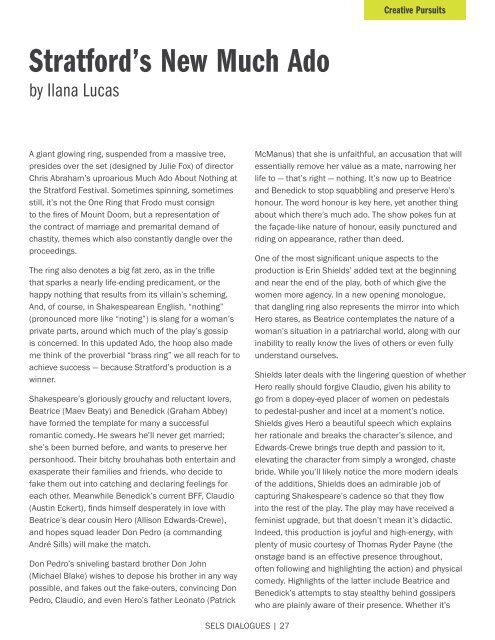SELS Dialogues Journal Volume 3 Issue 1
A diverse collection of articles, each offering a unique perspective and contributing to the ever-expanding landscape of knowledge and creativity.
A diverse collection of articles, each offering a unique perspective and contributing to the ever-expanding landscape of knowledge and creativity.
Create successful ePaper yourself
Turn your PDF publications into a flip-book with our unique Google optimized e-Paper software.
Creative Pursuits<br />
Stratford’s New Much Ado<br />
by Ilana Lucas<br />
A giant glowing ring, suspended from a massive tree,<br />
presides over the set (designed by Julie Fox) of director<br />
Chris Abraham’s uproarious Much Ado About Nothing at<br />
the Stratford Festival. Sometimes spinning, sometimes<br />
still, it’s not the One Ring that Frodo must consign<br />
to the fires of Mount Doom, but a representation of<br />
the contract of marriage and premarital demand of<br />
chastity, themes which also constantly dangle over the<br />
proceedings.<br />
The ring also denotes a big fat zero, as in the trifle<br />
that sparks a nearly life-ending predicament, or the<br />
happy nothing that results from its villain’s scheming.<br />
And, of course, in Shakespearean English, “nothing”<br />
(pronounced more like “noting”) is slang for a woman’s<br />
private parts, around which much of the play’s gossip<br />
is concerned. In this updated Ado, the hoop also made<br />
me think of the proverbial “brass ring” we all reach for to<br />
achieve success — because Stratford’s production is a<br />
winner.<br />
Shakespeare’s gloriously grouchy and reluctant lovers,<br />
Beatrice (Maev Beaty) and Benedick (Graham Abbey)<br />
have formed the template for many a successful<br />
romantic comedy. He swears he’ll never get married;<br />
she’s been burned before, and wants to preserve her<br />
personhood. Their bitchy brouhahas both entertain and<br />
exasperate their families and friends, who decide to<br />
fake them out into catching and declaring feelings for<br />
each other. Meanwhile Benedick’s current BFF, Claudio<br />
(Austin Eckert), finds himself desperately in love with<br />
Beatrice’s dear cousin Hero (Allison Edwards-Crewe),<br />
and hopes squad leader Don Pedro (a commanding<br />
André Sills) will make the match.<br />
Don Pedro’s sniveling bastard brother Don John<br />
(Michael Blake) wishes to depose his brother in any way<br />
possible, and fakes out the fake-outers, convincing Don<br />
Pedro, Claudio, and even Hero’s father Leonato (Patrick<br />
McManus) that she is unfaithful, an accusation that will<br />
essentially remove her value as a mate, narrowing her<br />
life to — that’s right — nothing. It’s now up to Beatrice<br />
and Benedick to stop squabbling and preserve Hero’s<br />
honour. The word honour is key here, yet another thing<br />
about which there’s much ado. The show pokes fun at<br />
the façade-like nature of honour, easily punctured and<br />
riding on appearance, rather than deed.<br />
One of the most significant unique aspects to the<br />
production is Erin Shields’ added text at the beginning<br />
and near the end of the play, both of which give the<br />
women more agency. In a new opening monologue,<br />
that dangling ring also represents the mirror into which<br />
Hero stares, as Beatrice contemplates the nature of a<br />
woman’s situation in a patriarchal world, along with our<br />
inability to really know the lives of others or even fully<br />
understand ourselves.<br />
Shields later deals with the lingering question of whether<br />
Hero really should forgive Claudio, given his ability to<br />
go from a dopey-eyed placer of women on pedestals<br />
to pedestal-pusher and incel at a moment’s notice.<br />
Shields gives Hero a beautiful speech which explains<br />
her rationale and breaks the character’s silence, and<br />
Edwards-Crewe brings true depth and passion to it,<br />
elevating the character from simply a wronged, chaste<br />
bride. While you’ll likely notice the more modern ideals<br />
of the additions, Shields does an admirable job of<br />
capturing Shakespeare’s cadence so that they flow<br />
into the rest of the play. The play may have received a<br />
feminist upgrade, but that doesn’t mean it’s didactic.<br />
Indeed, this production is joyful and high-energy, with<br />
plenty of music courtesy of Thomas Ryder Payne (the<br />
onstage band is an effective presence throughout,<br />
often following and highlighting the action) and physical<br />
comedy. Highlights of the latter include Beatrice and<br />
Benedick’s attempts to stay stealthy behind gossipers<br />
who are plainly aware of their presence. Whether it’s<br />
<strong>SELS</strong> DIALOGUES | 27















